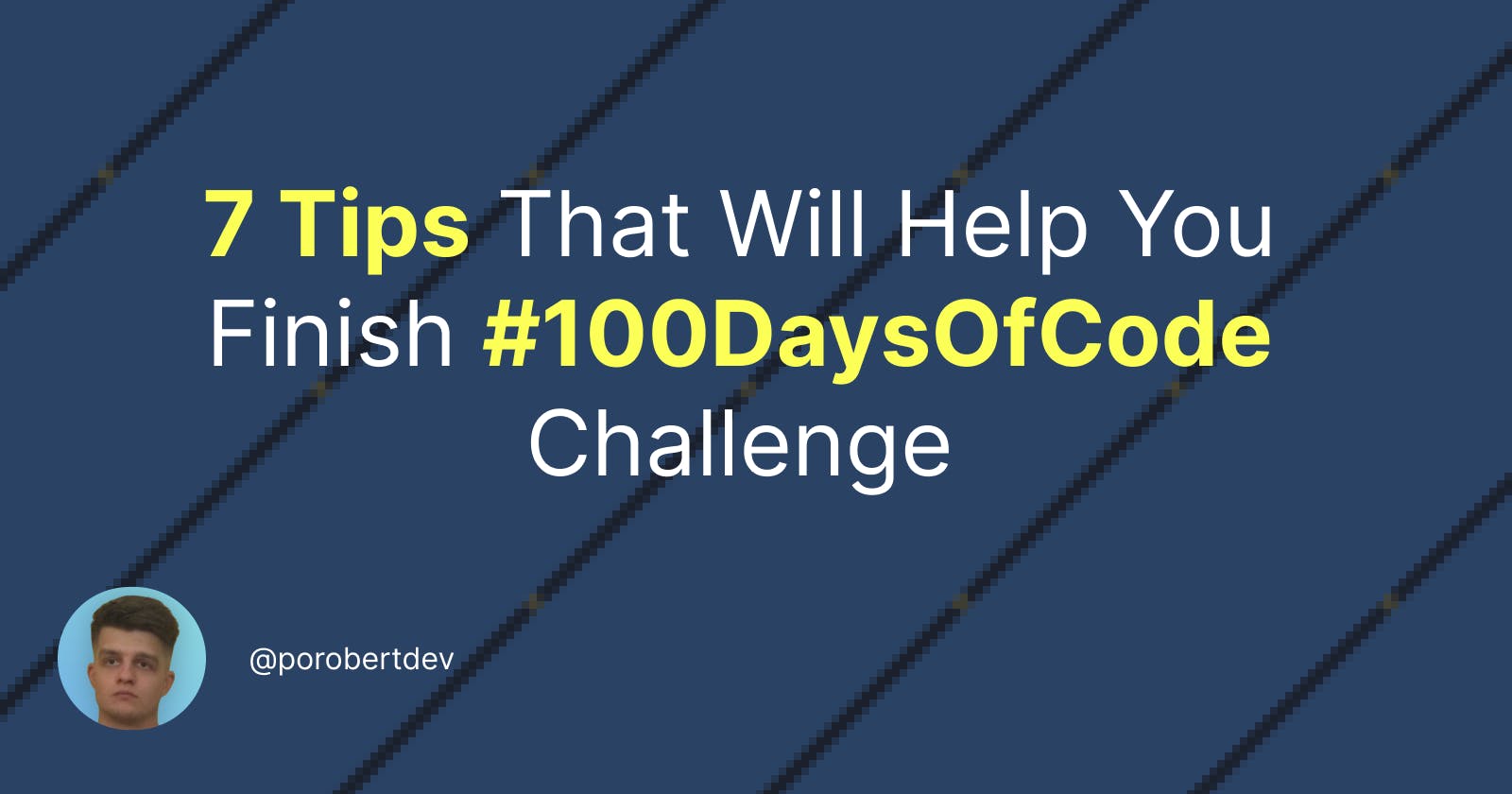Many people that want to learn programming joins the #100DaysOfCode challenge created by Alex Kallaway. I'm no exception.
I'm addressing this post to this kind of people. As you'll see, my second tip is pretty much against the rules of the challenge.
Oh boi, it was hard. It was really hard to stick with it and don't give up. It's not only a coding challenge, but it also challenges your mind a lot. And if you don't control your mind, then you'll be left behind, unfortunately.
I'm gonna share with you 7 tips that helped me stick with this challenge. Those are based on my experience and the type of person I am. Maybe they won't work with you, but I hope that at least you'll get some value before closing this tab.
1. Remember your WHY
I can't emphasize this enough. This has always been my salvation in my worst times when I felt like giving up. If you don't have a why, please take some time and define it. It's very important!
As I said in my about page, I'm currently a warehouse worker. I hate the job and I have to go there day by day. I'm trying to use each day as motivation to stick with programming. It's not just the hate nor the money. I always was interested in programming and tech in general, but that's for another blog post. I can't deny that the perks are awesome though.
So, that's my why. If you don't work on yourself then you'll just stay the same.
2. Go at your own pace
One of the #100DaysOfCode challenge's rules is to code at least one hour and post your update daily. This has pros, but also cons.
It really helped me with consistency in the beginning. Even if I didn't have followers at all, I felt some pressure and duty to post my progress for the day. This worked fine for me until about half of the challenge.
You see, sometimes life gets in the way, sometimes you "fail" the day, sometimes you need more rest, and the list goes on. Life happens and we have different lives. For example, I have a full-time job and I'm single, but I know it's different for someone with a wife and kids. Everyone's journey is gonna be different.
As you see, it happened a few times to me. But instead of simply giving up, I'm sticking with it and trying to do better the next time.
Just because you couldn't code for a day or few and didn't post your #100DaysOfCode progress, it doesn't mean you have failed your programming journey. In fact, everyone's programming journey is full of ups and downs, and the progress is not linear. You could even post your progress made in 3-5 days in one post if that suits you better, like I've been doing lately.
The takeaway is that as long as you're consistent and don't give up, a missed day or two won't be a big deal in the long run.
3. Don't listen to negative people
I mean, the trolls. Let me give you an example from my experience. I don't have friends at all in real life, and at some point, I told coworkers that I'm studying programming. They laugh and make jokes about that even today.
But you know what? They won't laugh anymore one or two years from now on, but they'll start questioning me. I'm sure of it! 🙂 I don't even know why I told them. Maybe I was just excited about it, but I recommend you to not do that.
4. Surround yourself with people from the tech industry
You need people around you, whether that's online or offline, people who understand, support and help you.
In today's age, that's very easy to do thanks to the internet. You have tech communities pretty much everywhere: Twitter, Discord, Telegram etc. I highly recommend podcasts and Twitter spaces.
5. Prioritize your sleep
This is very important too.
The "work hard, sacrifice sleep" type of thing is a trap in my opinion. First of all, that's not sustainable. It's only a matter of days or weeks until you start to feel miserable.
Do you think that in that state you'll make the same progress, and you'll be motivated or productive as before? No, you won't. I tried it myself. Studying programming for 2 hours daily while sleeping enough is much better in the long run than studying 4 hours with less sleep.
Maybe it can work for some people, but certainly not for me. Every time I sleep less than 7 hours, I feel so tired and my brain barely works at all.
By sleeping enough you also feel more energized during the day, and you're more likely to stay consistent since you feel good. Consistency is the most important thing in your programming journey, and all the tips shared here go hand in hand with that.
Prioritize not only your sleep but your overall health. The better you feel, the easier is to stay consistent with your journey.
6. Set a deadline
Be aware that this might cause too much stress sometimes, but at the same time can also help you a lot. It feels pretty much like any exam. You feel that pressure to learn and you can't stop. The deadline paired with your why is a powerful tool. Those are the main two things that I think about when I feel like giving up.
I set it in my mind on March 2024, and nowadays I think pretty often about it.
7. Avoid reading about AI
Seriously. I even muted words related to AI & ChatGPT on Twitter, so that I don't get to see the tweets related to it. It only has a big negative impact on someone who just started to learn programming. It only leads to thoughts such as "What's the point of learning programming if AI can do it?" And where does this lead further? To thoughts about quitting.
You don't need to hear or worry about AI. Don't make things harder than they already are.
I think it's also better to avoid using it as a studying companion, and instead, you should google. Or even better, ask in communities and you could even find a real studying companion. The Odin Project's curriculum says something about this too.
Wrapping up
Thank you for reading this!😊
Let me and other people know in the comments how was your first #100DaysOfCode challenge, and any other tips you'd like to share!

